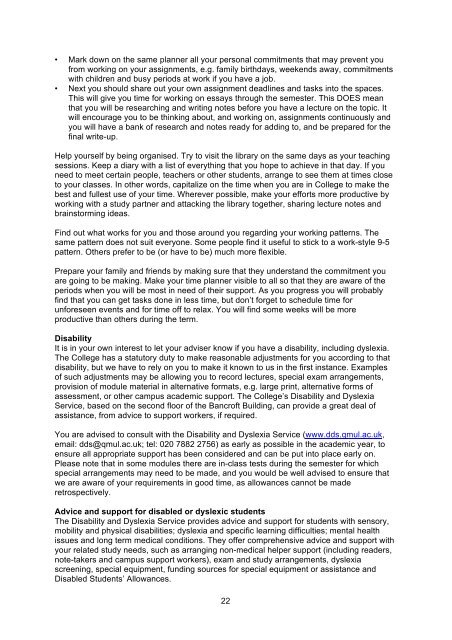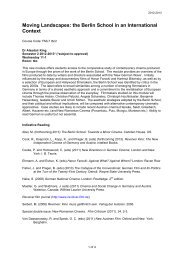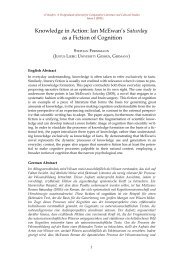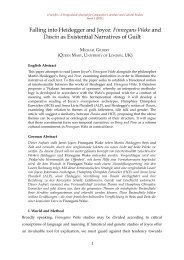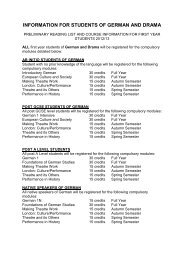Student Handbook - The School of Language, Linguistics and Film
Student Handbook - The School of Language, Linguistics and Film
Student Handbook - The School of Language, Linguistics and Film
Create successful ePaper yourself
Turn your PDF publications into a flip-book with our unique Google optimized e-Paper software.
• Mark down on the same planner all your personal commitments that may prevent you<br />
from working on your assignments, e.g. family birthdays, weekends away, commitments<br />
with children <strong>and</strong> busy periods at work if you have a job.<br />
• Next you should share out your own assignment deadlines <strong>and</strong> tasks into the spaces.<br />
This will give you time for working on essays through the semester. This DOES mean<br />
that you will be researching <strong>and</strong> writing notes before you have a lecture on the topic. It<br />
will encourage you to be thinking about, <strong>and</strong> working on, assignments continuously <strong>and</strong><br />
you will have a bank <strong>of</strong> research <strong>and</strong> notes ready for adding to, <strong>and</strong> be prepared for the<br />
final write-up.<br />
Help yourself by being organised. Try to visit the library on the same days as your teaching<br />
sessions. Keep a diary with a list <strong>of</strong> everything that you hope to achieve in that day. If you<br />
need to meet certain people, teachers or other students, arrange to see them at times close<br />
to your classes. In other words, capitalize on the time when you are in College to make the<br />
best <strong>and</strong> fullest use <strong>of</strong> your time. Wherever possible, make your efforts more productive by<br />
working with a study partner <strong>and</strong> attacking the library together, sharing lecture notes <strong>and</strong><br />
brainstorming ideas.<br />
Find out what works for you <strong>and</strong> those around you regarding your working patterns. <strong>The</strong><br />
same pattern does not suit everyone. Some people find it useful to stick to a work-style 9-5<br />
pattern. Others prefer to be (or have to be) much more flexible.<br />
Prepare your family <strong>and</strong> friends by making sure that they underst<strong>and</strong> the commitment you<br />
are going to be making. Make your time planner visible to all so that they are aware <strong>of</strong> the<br />
periods when you will be most in need <strong>of</strong> their support. As you progress you will probably<br />
find that you can get tasks done in less time, but don’t forget to schedule time for<br />
unforeseen events <strong>and</strong> for time <strong>of</strong>f to relax. You will find some weeks will be more<br />
productive than others during the term.<br />
Disability<br />
It is in your own interest to let your adviser know if you have a disability, including dyslexia.<br />
<strong>The</strong> College has a statutory duty to make reasonable adjustments for you according to that<br />
disability, but we have to rely on you to make it known to us in the first instance. Examples<br />
<strong>of</strong> such adjustments may be allowing you to record lectures, special exam arrangements,<br />
provision <strong>of</strong> module material in alternative formats, e.g. large print, alternative forms <strong>of</strong><br />
assessment, or other campus academic support. <strong>The</strong> College’s Disability <strong>and</strong> Dyslexia<br />
Service, based on the second floor <strong>of</strong> the Bancr<strong>of</strong>t Building, can provide a great deal <strong>of</strong><br />
assistance, from advice to support workers, if required.<br />
You are advised to consult with the Disability <strong>and</strong> Dyslexia Service (www.dds.qmul.ac.uk,<br />
email: dds@qmul.ac.uk; tel: 020 7882 2756) as early as possible in the academic year, to<br />
ensure all appropriate support has been considered <strong>and</strong> can be put into place early on.<br />
Please note that in some modules there are in-class tests during the semester for which<br />
special arrangements may need to be made, <strong>and</strong> you would be well advised to ensure that<br />
we are aware <strong>of</strong> your requirements in good time, as allowances cannot be made<br />
retrospectively.<br />
Advice <strong>and</strong> support for disabled or dyslexic students<br />
<strong>The</strong> Disability <strong>and</strong> Dyslexia Service provides advice <strong>and</strong> support for students with sensory,<br />
mobility <strong>and</strong> physical disabilities; dyslexia <strong>and</strong> specific learning difficulties; mental health<br />
issues <strong>and</strong> long term medical conditions. <strong>The</strong>y <strong>of</strong>fer comprehensive advice <strong>and</strong> support with<br />
your related study needs, such as arranging non-medical helper support (including readers,<br />
note-takers <strong>and</strong> campus support workers), exam <strong>and</strong> study arrangements, dyslexia<br />
screening, special equipment, funding sources for special equipment or assistance <strong>and</strong><br />
Disabled <strong>Student</strong>s’ Allowances.<br />
22


